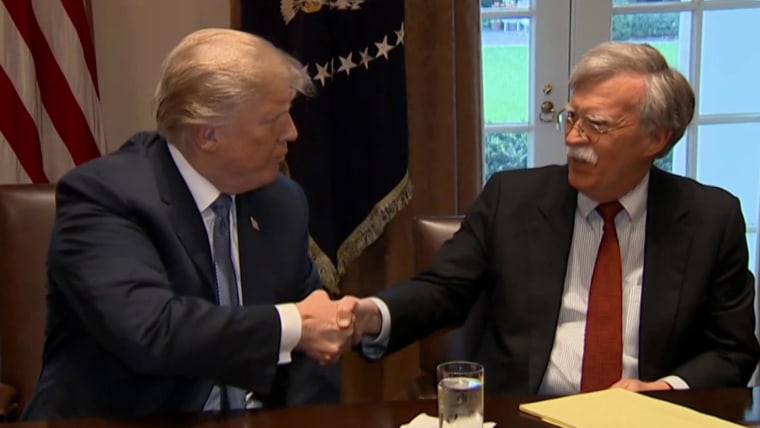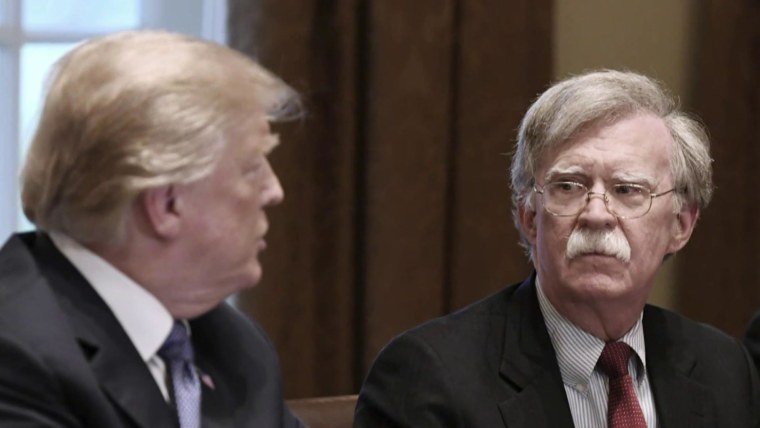Beijing on Thursday lashed out after President Donald Trump signed a law Wednesday calling for sanctions to punish Chinese officials for human rights abuses against that country's Uighur Muslim minority.
The latest bout in the ongoing war of words between the world's two largest economies comes after allegations in excerpts of a book by former national security adviser John Bolton that Trump told China's leader, Xi Jinping, that he supported Beijing's construction of camps to detain Uighurs.
"We again urge the U.S. side to immediately correct its mistakes and stop using this Xinjiang-related law to harm China's interests and interfere in China's internal affairs," China's Foreign Ministry said in a statement on Thursday, referring to the region in the northwest of the country where many Uighurs live.
"Otherwise, China will resolutely take countermeasures, and all the consequences arising therefrom must be fully borne by the United States," it added, without detailing what such countermeasures might entail.

China denies mistreatment of the Uighurs and responded to the latest U.S. move with anger, saying it was a malicious attack that "vilified" the human rights situation in Xinjiang.
Bolton wrote that according to an interpreter, "Trump said that Xi should go ahead with building the camps, which Trump thought was exactly the right thing to do."
Many countries have voiced their condemnation at the United Nations of China's treatment of Uighurs. The U.N. estimates that more than a million Muslims have been detained in the Xinjiang camps. China says the camps provide vocational training and are needed to fight extremism.
Bolton also asserts that Trump asked Xi to agree to trade policies that would help with his re-election bid in November. Responding to this claim, China said on Thursday that it had no intention of interfering in U.S. elections, according to foreign ministry spokesman Zhao Lijian.
NBC News was not able to verify the claims in the book, which is due out Tuesday. The Justice Department has filed a lawsuit aimed at delaying publication, as well as an emergency application for a temporary restraining order to prevent publication.
Trump, meanwhile, has accused Bolton of publishing classified information in his book, and suggested he should face criminal charges. The White House has not directly responded to the charges but Thursday morning, Trump tweeted the book was "made up of lies & fake stories" and called his former adviser a "disgruntled boring fool."
Bolton entered the White House in spring 2018 but resigned a year later. Trump says he fired him.
While Trump was signing the Uighur human rights law, Secretary of State Mike Pompeo was meeting with China's top diplomat, Yang Jiechi, in Hawaii.
Yang told Pompeo "both sides stand to gain from cooperation and will lose from confrontation," according to a statement from China's foreign ministry on Thursday. And that Washington needed to respect Beijing's positions on key issues such as Hong Kong, Taiwan and Xinjiang.
"Cooperation is the only correct choice for both sides," Yang said. "It is hoped that the U.S. and China will go hand-in-hand."
While China and the U.S. were already locked in a trade war, relations between Beijing and Washington have taken a turn for the worse since the outbreak of the coronavirus. Pompeo has been a vocal critic of China's handling of the pandemic, angering China by referring to the disease as the "China virus" and stoking international blame towards the country for the deadly outbreak.
In Honolulu, Pompeo stressed "the need for fully-reciprocal dealings between the two nations across commercial, security, and diplomatic interactions," U.S. State Department spokeswoman Morgan Ortagus said in a statement.
Experts fear U.S.-China relations have reached their lowest point in years, with some calling it the start of a new Cold War. Meanwhile, Trump and his administration are stepping-up rhetoric against China in the run-up to the November election, where the Asian country looks set to be a key political issue.
Reuters contributed to this report.

